Taxi (1978-83): The Cynical Sitcom
From a traditional sitcom perspective, Taxi can be seen as subversive. Sitcoms usually revolve around a family or group of friends, who have many cheerful adventures and occasional troubles, but they are resolved by an episode’s end. However, Taxi can be seen as an exception. Taxi was set in and around a New York City cab service ironically named Sunshine Cabs, its main characters may have been a strong group of friends, yet within their personal lives there was constant frustration, heartbreak and jaded outlooks on life. In contrast to the majority of sitcoms, the characters’ growing cynicism made Taxi stand out. Their lives were always stuck in a hopeless fusion of depression, rejection and harsh circumstance. Five episodes in particular emphasise how Taxi can be seen as subversive for its jaded outlook.
5. Like Father, Like Daughter (Season One, Episode One)
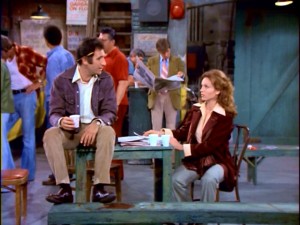
Taxi‘s pilot episode establishes its hapless environment as the main characters grind their way through life. Like Father, Like Daughter‘s opening scene in the Sunshine Cab’s dispatch area reflects a humdrum life, where the cabbies have orders commanded at them. Elaine, a new cabbie, entered the Sunshine Cab’s dispatch area with lofty ambitions of entering the arts. For Elaine being a cabbie was only a part-time occupation in her mind, which was retrospectively shown in later seasons to be a naive notion. However, Alex immediately recognised Elaine’s optimism and denounced it. “We’re all part-time here”, Alex states, before pointing to various colleagues and telling Elaine their personal ambitions, which are non-existent. “Me, I’m a cab driver”, Alex tells Elaine with profound honesty. Taxi offers no room for a hopeful existence, instead it was a place of lost causes. Taxi was not afraid to reveal the lives of Sunshine Cab employees as depressing because it was reflecting reality, Taxi was unconcerned with glossing over their lives. This led to Alex’s own situation in life, a lonely man who has not seen his daughter Cathy in fifteen years after breaking up with his wife. Elaine reacts in disgust, feeling Alex was immoral for allowing himself to disconnect with Cathy, even if his ex-wife asks Alex to do so. Elaine’s disgust made audiences question Alex’s morality, in turn consolidating Taxi as an exceptional sitcom for challenging its audience before making them laugh.
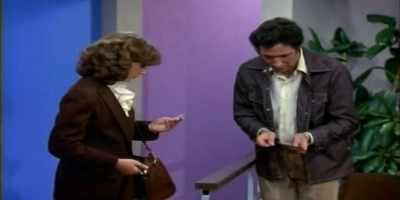
Alex, after some reluctance, decides to call Cathy. Alex hurries to reunite with Cathy after discovering she is leaving for Portugal. When they meet, there is an instant awkwardness as neither knows how to respond to the others’ presence. Although Cathy and Alex managed to have a conversation, she becomes annoyed when Alex refers to himself as her father. This is an obvious reaction considering the fifteen years in which they were apart, which Alex equally accepts as his fault yet was saddened by it due to his guilt. Taxi within this moment reflects how it will never glossed over realities within difficult situations. Alex acted out on a whim and traveled to see Cathy, it was not a melodramatic moment where happy emotions washed away the gulf between them. Instead, Alex has to face the fact that he was a poor father, giving up Cathy with ease and even admits, “I was looking for an easy way out myself”. Alex was not a good father and admits his flaws, instead of pretending to have been concerned. Cathy accepts Alex’s flaws and there is a small chance of future contact, yet there is also a chance they would never meet again. Taxi dealing with this subject matter in its pilot episode reflects its intentions to be a sitcom unconcerned with satisfactory endings.
4. The Great Line (Season One, Episode Six)
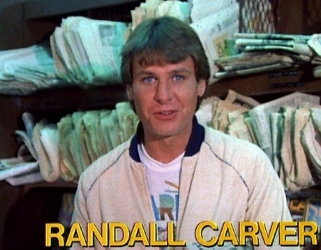
Taxi established John as a naive, moronic character by the time The Great Line aired. John was still unfamiliar with New York City whilst trying to gain a foothold as an actor. Taxi as a sitcom uses John’s naivety for humor, however The Great Line exploited his naivety for a complicated situation. Naivety as a psychological trait can be destructive within Taxi‘s depiction of life as facing harsh realities, shown when John deals with the consequences of spontaneously marrying Suzanne after meeting her at Mario’s (a bar regularly inhabited by Taxi‘s main characters). Bobby, John’s fellow cabbie, suggests John should use a witty chat-up line involving marriage as a joke to entice Suzanne. However, John takes Bobby’s advice to heart and subsequently persuades Suzanne to elope. John returns after a few days tells his colleagues that he and Suzanne eloped, reacting in horror. “I’m half crazy!” exclaims John, questioning what he had done.
John thought it was a funny game between himself and Suzanne, expecting her to pull out of the marriage proposal beforehand. John’s naivety got him into an unplanned marriage with serious consequences. John and Suzanne’s contrasting emotions reveal these serious consequences, who have to deal with their marriage in an adult manner, which they are not prepared for. Although they agree to stay married, in a later episode titled Money Troubles (season one, episode nine), John and Suzanne’s naivety causes marital problems. Taxi shows itself to be a sitcom adamant in reflecting life’s harsh realities through John and Suzanne’s marriage struggles, instead of glossing them over.
3. Going Home (Season Three, Episode Five)

By Taxi’s third season, Jim Ignatowski became a series regular, becoming part of the main group from season two onwards. Jim is a drifter with no friends or success who somehow managed to get himself a job at Sunshine Cabs. Jim spaced out in his own world, barely conscious of reality is never surprising. Taxi emphasises Jim’s wasted life by revealing he came from a rich family and was Harvard-educated, until he fell into drug addition. Jim’s tragic decline meant he could only find employment as a cab driver. Going Home shows Jim’s reunion with his family (accompanied by Alex) becoming filled with tension as the contrast between Jim and his family is clear. Jim and his brother Tom experience tension, partly due to Jim’s dazed state where he calls Tom by a false name. This got laughs from the audience, yet there is an underlining tension which escalates. Tom is of an intelligent mind and very formal. Jim could have been like Tom, if he had not fallen into drug addiction. This thought further reflects Jim’s life as a tragedy. Jim experiences similar tensions of mistaken identity with his father, who becomes increasingly frustrated to the point where he asks Alex if Jim has any sanity. Going Home emphasises Jim’s isolated status from his family as a tragedy considering Jim could have been successful, if he had not been the “rebel without a cause”, as his father said.
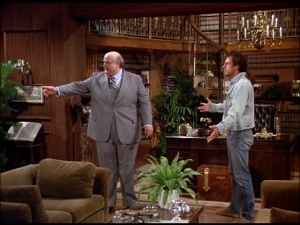
Going Home‘s pivotal scene is the conversation between Jim, his father and Alex. Jim’s father tells Alex that he is greatly disappointed in Jim, feeling his life is a waste and only interested in the family fortune. Jim denies his father’s claims stating he simply wanted to see his family again. Jim’s father contemplates this by offering Jim a chance to redeem himself, to continue his education and enter a professional career like Tom. Jim is told he must gain responsibility for himself, which Jim simply rejects. Jim’s decision speaks volumes as to Taxi’s jaded nature. Jim’s life is a waste due to his personality and when given an opportunity to redeem himself, he accepts his flaws and decides he can not succeed. Taxi through Going Home stays true to the sad reality of Jim’s life, he is suffering for his consequences and will continue to do so.
2. Nina Loves Alex (Season Four, Episode Thirteen)
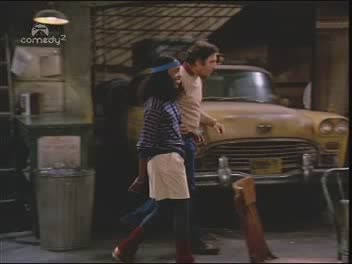
Throughout its series run, Taxi never let audiences forget Alex’s cynical nature through his various disappointing and sometimes bitter encounters. Nina Loves Alex explores this aspect of Alex’s character when he receives unwanted attention from new cabbie Nina, an overly enthusiastic person who is the complete opposite from Alex. Nina is infatuated with Alex to his obvious discomfort, shown in a conversation they share. ” I have a little alarm which goes off every time someone is being enthusiastic”, Alex tells Nina in a sarcastic manner. Alex’s cynicism continues when Nina tells him about her acting aspirations, which Alex discounts as unrealistic. This exchange is no different to Alex down playing Elaine in Like Father, Like Daughter. If audiences were knowledgeable of this fact, then it reflects a stark realism of Alex’s life consisting of unfulfillment and bitterness, which Taxi never distances itself from.
This continues as Alex becomes increasingly enraged with Nina’s attempts for attention, such as tying balloons to his cab and sending him love letters. Alex’s cynical nature disassociates him from anything which might offer happiness or positivity. Although Alex’s cynicism may seem negative, Nina Loves Alex reveals Alex to be true after Nina’s optimism is broken down following rejection for a Broadway part. It places truth in Alex’s cynicism regarding the realities of lofty ambitions, that life can be harsh and is rarely what people expect it to be.
1. Elaine and The Monk (Season Five, Episode Ten)

Elaine’s love life throughout Taxi always ended badly, partly reflecting the jaded reality Taxi likes to represent. If audiences understood this, then they could see Elaine and The Monk as a continuation of Elaine’s tragic love life. Elaine meets Zifka, a monk who had entered a brief break from his vow of silence. Zifka is struck by Elaine’s beauty and engages her romantically, “I’ll be praying for you to find happiness”, Zifka suggests to Elaine. Elaine enters a state of romantic bliss, which Taxi audiences know would end in heartache due to her previous experiences. Alex questions the validity of Elaine’s romance, since Zifka will soon return to his vow of silence. “You’re just jealous that you have no love in your life”, Elaine replies, which is open to interpretation.
There may have been cynicism on Alex’s part, yet there was also truth. Elaine and Zifka’s romance was never going to have longevity, therefore Elaine delving deep into her emotions can be seen as naive within a romance that had a bleak reality. This is reflected in Elaine and The Monk‘s final scene where Zifka’s break from his vow of silence stops, thus ending his relationship with Elaine. The silence shared between them was poignant for tragedy within Elaine’s love life. The looks they exchange convey a sexual longing which will never be fulfilled. Elaine’s relationship with Zifka echos the notion, better to have loved and lost, than to never have loved at all. Though some may see this as a positive notion, within Taxi it enhances the jaded representation of life as Elaine’s romantic desires remain void.
By representing life’s harsh realities and reflecting subversive qualities, Taxi distances itself from most other sitcoms. The sitcom was not afraid to explore its characters’ flaws or depict situations in a realistic manner. Complicated family situations with loved ones or re-assimilating one’s love life were just some of the themes explored, which audiences could relate to. Although Taxi‘s main characters were a strong group of friends, they could not always help each others’ personal problems or even change flawed characteristics, which damaged their chances of happiness. As a result, they were suffering from continuous frustration and heartbreak. Whenever such moments occurred, they always contained aspects of life’s harsh realities which had a profound affect upon the characters. In contrast to the happiness experienced by characters in other sitcoms, Taxi has become an exceptional part of sitcom history by reflecting its characters’ growing cynicism.
What do you think? Leave a comment.











A show that has never really aged! And really great writing and directing!
For me personally it was a time killer before the Dukes of Hazard came on.
Shame that it got cancelled, because I felt the last two years were the best.
Very interesting and thought provoking article. Thanks
Thank you Venus
Funny note, I never watched Taxi during its initial run during the late 1970s and early 1980s. Something about the title, I never got past that. However, during its re-runs during the 1990s I became an enthusiastic fan.
Was hoping you would mention my favorite episode. It is the 2-parter where the cabbies are on strike and they tell stories about the odd jobs they held. Iggy poured liquid and glass all over a woman’s carpet because he was supposed to be selling vacuum cleaners door to door–only to realize he was selling encyclopedias. Elaine with the boss that no one knew existed. Louie working as a sleazy cold-calling stockbroker.
I liked the one where Jim is in the abandoned building he has as his house and the wrecking ball comes in while he’s sitting there watching TV or something. He then moves in with Louie and accidentally burns his apartment up. I like his explanation of what happened with how he fell asleep while smoking but it was a beanbag chair or something that he left on the stove.
I am compelled to watch this show. Hope it is available on Netflix.
They are available on Youtube
Although I have not watched “Taxi” myself, I can appreciate your analysis of a sitcom as subversive. I believe this is the same case, in some respects, with my favorite sitcom, also set in NYC, “Seinfeld.”
I quite agree, I think Seinfeld’s subversive nature is further cemented by the fact that nobody ever learns any lessons, ever, and like Taxi, sometimes the problems are never resolved because the characters are too egocentric to consider changing.
Very good piece of study.
Thank you kapm
This is really well-done analysis. Interesting read!
Taxi is showing that that there are certain professions that attract a particular type of person, and that a cab driver is one of those jobs.